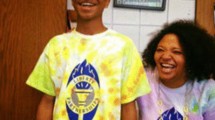Abstract
In reading Danielle Ferguson and Catherine Martin-Dunlop’s (2020) “Uncovering stories of resilience among successful African American women in STEM,” we call for an exploration into reimagining the practice of cultural brokering for supporting Black girls’ success in K-12 science and engineering. While none of the participants identified a teacher as a cultural broker, they each mentioned how this support would have contributed to a much different experience in learning science. Unfortunately, institutions such as schools, and their associated institutional agents, often necessitate Black girls to call upon coping strategies for navigating the racialized and gendered components of engaging in science. Sociohistorical and current positionings of Black girls in science learning spaces require their display of resilience, as opposed to spaces that allow them to play, learn, think critically and/or make mistakes without major consequences. In this piece, we ask the question—Are there ways in which to reimagine the process of cultural brokering that provides authentic opportunities for Black girls to succeed in K-12 science learning spaces and mitigate the need for compiling “resiliency stories”?
Similar content being viewed by others
References
Alemán, E., Jr., & Alemán, S. M. (2010). ‘Do Latin@ interests always have to “converge” with White interests’: (Re)claiming racial realism and interest-convergence in critical race theory praxis. Race Ethnicity and Education, 13(1), 1–21. https://doi.org/10.1080/13613320903549644
Ashford, S. N., Wilson, J. A., King, N. S., & Nyache, T. M. (2017). STEM sista spaces: Creating counterspaces for Black girls and women. In T. S. Ransaw & R. Majors (Eds.), Emerging issues and trends in education (pp. 3–38). East Lansing, MI: Michigan State University Press.
Bartolome, L. (1994). Beyond the methods fetish: Toward a humanizing pedagogy. Harvard Educational Review, 64(2), 173–195. https://doi.org/10.17763/haer.64.2.58q5m5744t325730.
Ferguson, D., & Martin-Dunlop, C. (2020). Uncovering stories of resilience among successful African American women in STEM. Cultural Studies in Science Education.
Gentemann, K. M., & Whitehead, T. L. (1983). The cultural broker concept in bicultural education. The Journal of Negro Education, 52(2), 118–129. https://doi.org/10.2307/2295029.
Jegede, O. J., & Aikenhead, G. S. (1999). Transcending cultural borders: Implications for science teaching. Research in Science & Technological Education, 17(1), 45–66.
Kimmerer, R. W. (2013). Braiding sweetgrass: Indigenous wisdom, scientific knowledge, and the teachings of plants. Canada: Milkweed Editions.
Kurth, L. A., Anderson, C. W., & Palincsar, A. S. (2002). The case of Carla: Dilemmas of helping all students to understand science. Science Education, 86(3), 287–313.
Lee, J. (1998). Cultural brokers: Race-based hiring in inner-city neighborhoods. American Behavioral Scientist, 41(7), 927–937.
Lopez, L., & Stack, C. (2001). Social capital and the culture of power: Lessons from the field. In S. Saegert, J. P. Thompson, & M. Warren (Eds.), Social capital and poor communities (pp. 31–59). New York: Russell Sage Foundation.
Martinez-Cosio, M., & Iannacone, R. M. (2007). The tenuous role of institutional agents: Parent liaisons as cultural brokers. Education and Urban Society, 39(3), 349–369.
Mensah, F. M., & Jackson, I. (2018). Whiteness as property in science teacher education. Teachers College Record, 120(1), 1–38.
McKinney de Royston, M., & Vakil, S. (2019). What it means to do this work: The voices of manhood development program (MDP) instructors and “politicized care.” In N. S. Nasir, J. R. Givens, & C. P. Chatmon (Eds.), “We dare say love:” Supporting achievement in the educational life of Black boys (pp. 51–62). New York, NY: Teachers College Press.
Milner, H. R., IV. (2008). Critical race theory and interest convergence as analytic tools in teacher education policies and practices. Journal of Teacher Education, 59(4), 332–346.
Shavers, M. C., & Moore, J. L. (2014). The double-edged sword: Coping and resiliency strategies of African American women enrolled in doctoral programs at predominantly white institutions. Frontiers, 35(3), 15–38.
Yosso, T. J. (2005). Whose culture has capital? A critical race theory discussion of community cultural wealth. Race Ethnicity and Education, 8(1), 69–91. https://doi.org/10.1080/1361332052000341006.
Author information
Authors and Affiliations
Corresponding author
Additional information
Lead Editor: F. M. Mensah.
Publisher's Note
Springer Nature remains neutral with regard to jurisdictional claims in published maps and institutional affiliations.
This review essay addresses issues raised in Danielle Ferguson and Catherine Martin-Dunlop’s paper entitle: Uncovering stories of resilience among successful African American women in STEM (https://doi.org/10.1007/s11422-020-10006-8 ).
Rights and permissions
About this article
Cite this article
Wright, C., Riley, A. Mitigating the need for resiliency for Black girls: reimagining the cultural brokering through a lens of science as white property. Cult Stud of Sci Educ 16, 495–500 (2021). https://doi.org/10.1007/s11422-020-10005-9
Received:
Accepted:
Published:
Issue Date:
DOI: https://doi.org/10.1007/s11422-020-10005-9




